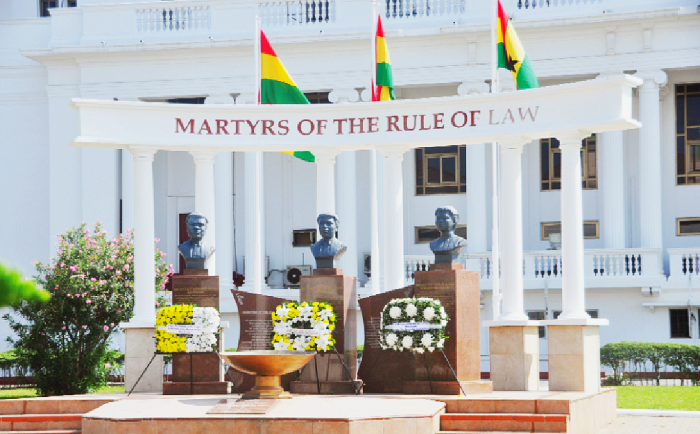Today, June 30, Ghana solemnly commemorates Martyrs Day—a national day of remembrance for three high court judges and a retired army officer who were brutally murdered on this day in 1982. Their deaths, still etched in the nation’s conscience, remain a chilling reminder of the price paid for rule of law, independence of the judiciary, and democratic principles.
The Events of June 30, 1982
On the night of June 30, 1982, the country was under curfew. Ghana was ruled by the Provisional National Defence Council (PNDC), chaired by Flight Lieutenant Jerry John Rawlings, who had seized power in a military coup on December 31, 1981. Armed soldiers patrolled the streets, enforcing strict curfew regulations.
Between 9:00 p.m. and 10:30 p.m. GMT, three high court judges—Justice Cecilia Koranteng-Addow, Justice Fred Poku Sarkodee, and Justice Kwadjo Agyei Agyepong—along with retired army officer Major Sam Acquah—were abducted from their homes in Accra. The victims were later taken to the Bundase Military Shooting Range, where they were executed in cold blood and their bodies set on fire.
The country was thrown into shock and outrage. These murders, during a time of military dictatorship and repression, were perceived not just as heinous crimes but as an attack on the judicial independence and constitutional rule of law.
The Aftermath and Justice
Following widespread public condemnation, the PNDC government set up a Special Investigations Board (SIB) to probe the murders. The SIB report implicated several members of the PNDC and its military apparatus. Four persons—including a former member of the PNDC, Joachim Amartey Kwei—were tried and convicted. They were sentenced to death by firing squad, and their executions were carried out in 1983.
Read Also: Protests Hit Togo Over Gnassingbé’s Rule-for-Life Move
Although the official narrative held the perpetrators accountable, many Ghanaians believed the full truth about the killings had never been revealed, sparking debates and distrust that have lasted decades.
Legacy and Importance of Martyrs Day
Martyrs Day serves as a symbolic call to protect the independence of the judiciary and uphold human rights. The lives lost that day are not just remembered for the tragedy but for their courage to remain impartial in a time when judges were pressured or targeted for political reasons.
Justice Cecilia Koranteng-Addow, in particular, stood out for her rulings that challenged executive overreach, making her a target for political reprisal. Her story has become a symbol of judicial bravery and integrity in Ghana’s legal history.
Every year on June 30, commemorations are held at the Judicial Service headquarters in Accra, with wreath-laying ceremonies, moments of silence, and speeches from government officials, legal professionals, and civil society groups.
Ghana’s Ongoing Commitment to Rule of Law
As Ghana continues to strengthen its democracy, Martyrs Day remains a stark reminder of the consequences of political instability and authoritarian rule. It also stands as a warning against attempts to undermine the judiciary, media, or civil institutions.
It’s a day that reminds both leaders and citizens of Ghana’s hard-won freedom and the need to guard it fiercely.

